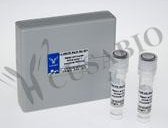FFAR3 Antibody, FITC conjugatedСпецификация| Объем | 100 мкг | | Синонимы | Free fatty acid receptor 3 (G-protein coupled receptor 41), FFAR3, GPR41 | | Клональность | Polyclonal Antibody | | Организм | Human | | uniprot | O14843 | | Иммуноген | Recombinant Human Free fatty acid receptor 3 protein (280-346AA) | | Источник | Rabbit | | Видовая специфичность | Human | | Применение | ELISA | | Примечание | G protein-coupled receptor that is activated by a major product of dietary fiber digestion, the short chain fatty acids (SCFAs), and that plays a role in the regulation of whole-body energy homeostasis and in intestinal immunity. In omnivorous mammals, the short chain fatty acids acetate, propionate and butyrate are produced primarily by the gut microbiome that metabolizes dietary fibers. SCFAs serve as a source of energy but also act as signaling molecules. That G protein-coupled receptor is probably coupled to the pertussis toxin-sensitive, G(i/o)-alpha family of G proteins. Its activation results in the formation of inositol 1,4,5-trisphosphate, the mobilization of intracellular calcium, the phosphorylation of the MAPK3/ERK1 and MAPK1/ERK2 kinases and the inhibition of intracellular cAMP accumulation (PubMed:12711604). Activated by SCFAs and by beta-hydroxybutyrate, a ketone body produced by the liver upon starvation, it inhibits N-type calcium channels and modulates the activity of sympathetic neurons through a signaling cascade involving the beta and gamma subunits of its coupled G protein, phospholipase C and MAP kinases. Thereby, it may regulate energy expenditure through the control of the sympathetic nervous system that controls for instance heart rate. Upon activation by SCFAs accumulating in the intestine, it may also signal to the brain via neural circuits which in turn would regulate intestinal gluconeogenesis. May also control the production of hormones involved in whole-body energy homeostasis. May for instance, regulate blood pressure through renin secretion. May also regulate secretion of the PYY peptide by enteroendocrine cells and control gut motility, intestinal transit rate, and the harvesting of energy from SCFAs produced by gut microbiota. May also indirectly regulate the production of LEP/Leptin, a hormone acting on the CNS to inhibit food intake, in response to the presence of short-chain fatty acids in the intestine. Finally, may also play a role in glucose homeostasis. Besides its role in energy homeostasis, may play a role in intestinal immunity. May mediate the activation of the inflammatory and immune response by SCFAs in the gut, regulating the rapid production of chemokines and cytokines by intestinal epithelial cells. Among SCFAs, the fatty acids containing less than 6 carbons, the most potent activators are probably propionate, butyrate and pentanoate while acetate is a poor activator (PubMed:12496283, PubMed:12711604). | | Клональность1 | Polyclonal | | Изотип | IgG | | Коньюгат | FITC | | Буффер | Preservative: 0.03% Proclin 300<br />Constituents: 50% Glycerol, 0.01M PBS, PH 7.4 | | Форма | Liquid | | Хранение | Upon receipt, store at -20°C or -80°C. Avoid repeated freeze. | | Метод очистки | >95%, Protein G purified | | Области исследований | Cardiovascular, Metabolism | | Ссылка на страницу на сайте производителя | ссылка | | | |
Информация для заказа| Область использования: | Производство: | Cusabio | | Метод: | Антитела | | Объем: | 100 мкг | | Кат. номер: | CSB-PA008606LC01HU | | Цена (с НДС 20%): | по запросу | В корзину  |  Наименование: FFAR3 Antibody, FITC conjugated. Наименование: FFAR3 Antibody, FITC conjugated.
Примечание: дополнительная информация (на английском языке). |
|
